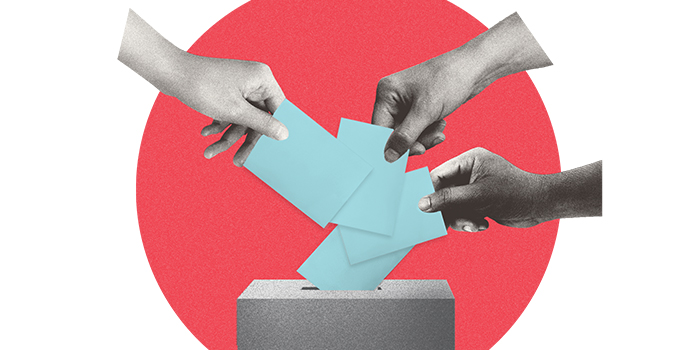
America First Policy Institute v. Biden
What's at Stake
The ACLU, along with several partner organizations, are representing the rights of voters by intervening in a lawsuit that seeks to make it harder for Americans across the country to register to vote, including in the upcoming 2024 election. In 2021, President Biden signed an executive order aimed at promoting access to voter registration and election information to eligible voters on a nonpartisan basis. Now, on the eve of the 2024 election, a small group of political candidates and election administrators seek to block the executive order, based on speculation and unfounded claims of election manipulation and noncitizen voting. The ACLU and its partners are fighting to preserve the ability of eligible Americans to register to vote, in accordance with federal law.
Summary
Under federal law, “it is the duty of the Federal, State, and local governments to promote the exercise” of the fundamental right to vote. 52 U.S.C. § 20501.
Consistent with that duty, on March 7, 2021, President Biden issued Executive Order No. 14019, which purpose is to “protect and promote the exercise of the right to vote, eliminate discrimination and other barriers to voting, and expand access to voter registration and accurate election information.” The Order recognized that Americans face many obstacles to voting, including “difficulties with voter registration, lack of election information, and barriers to access at polling places.”
To help mitigate those obstacles to voting, the Order, among other things, encourages federal agencies to provide accurate information about voter registration and elections to eligible voters; to serve as voter registration agencies (similar to the role played by DMVs around the country), in accordance with the National Voter Registration Act, if asked to do so by a state; and to modernize and facilitate public access to Vote.Gov, a popular website used to help Americans register to vote. Under federal law, which the Executive Order required agencies to follow, voter registration activities conducted by government agencies must remain nonpartisan. 52 U.S.C. § 20506(a)(5).
More than three years after issuance of the Executive Order, a group of plaintiffs filed a lawsuit challenging the legality of the Executive Order. The Plaintiffs consist of the American First Policy Institute, the Secretaries of State for Ohio and Montana, two local election administrators from Michigan and Wisconsin, several Republican candidates, and the state-level Republican Party from Georgia, Utah, and Michigan.
On September 10, 2024, the Plaintiffs filed a motion seeking emergency relief from the U.S. District Court in the Northern District of Texas, seeking to enjoin the Executive Order and the entire federal government’s implementation of the Order to facilitate nonpartisan voter education and registration. Plaintiffs are opposing implementation of the Executive Order and expansion of voter registration opportunities based solely on speculation, implausible conspiracies, and unwarranted deductions. Plaintiffs’ lawsuit is nothing more than a disagreement with the current Administration about promoting voter registration and voter participation in accordance with federal and state law.
Four days after the Plaintiffs’ motion, the ACLU, along with the ACLU of Texas, Asian Americans Advancing Justice, the Brennan Center for Justice, the Native American Rights Fund, and the League of Women Voters moved to intervene in the lawsuit on behalf of the League of Women Voters of the United States, Black Voters Matter, and Naeva.
The ACLU and its clients and partners simultaneously moved to dismiss the lawsuit, on multiple grounds, including that Plaintiffs cannot claim an injury based on eligible Americans registering to vote. Moreover, the Plaintiffs who are election officials in their respective jurisdictions—Suzanne Pinnow from Thornapple, Rusk County, Wisconsin; Robert Genetski from Allegan County in Michigan; Christi Jacobsen from Montana; and Frank LaRose from Ohio—cannot claim that they are “burdened” by the work of registering additional voters when that is a legally required aspect of their job.
Plaintiffs have requested that the District Court issue a decision on their motion for emergency relief by September 16, 2024.
Legal Documents
-
07/31/2024
Amended Complaint -
09/10/2024
Motion for TRO and Preliminary Injunction -
09/14/2024
Intervenor-Defendants’ Motion to Intervene -
09/14/2024
Intervenor-Defendants’ Proposed Motion to Dismiss -
09/14/2024
DOJ Combined Motion to Dismiss and Opposition to Preliminary Injunction -
09/14/2024
Intervenor-Defendants' Brief in Support of Motion to Intervene -
09/10/2024
Plaintiffs' Brief in Support of Motion for TRO and PI
Date Filed: 07/31/2024
Court: District Court (N.D. Tex.)
Download DocumentDate Filed: 09/10/2024
Court: District Court (N.D. Tex.)
Download DocumentDate Filed: 09/14/2024
Court: District Court (N.D. Tex.)
Download DocumentDate Filed: 09/14/2024
Court: District Court (N.D. Tex.)
Download DocumentDate Filed: 09/14/2024
Court: District Court (N.D. Tex.)
Download DocumentDate Filed: 09/14/2024
Court: District Court (N.D. Tex.)
Download DocumentDate Filed: 09/10/2024
Court: District Court (N.D. Tex.)
Download DocumentPress Releases
Civic Engagement Groups Seek to Intervene in Challenge to Executive Order on Voter Registration